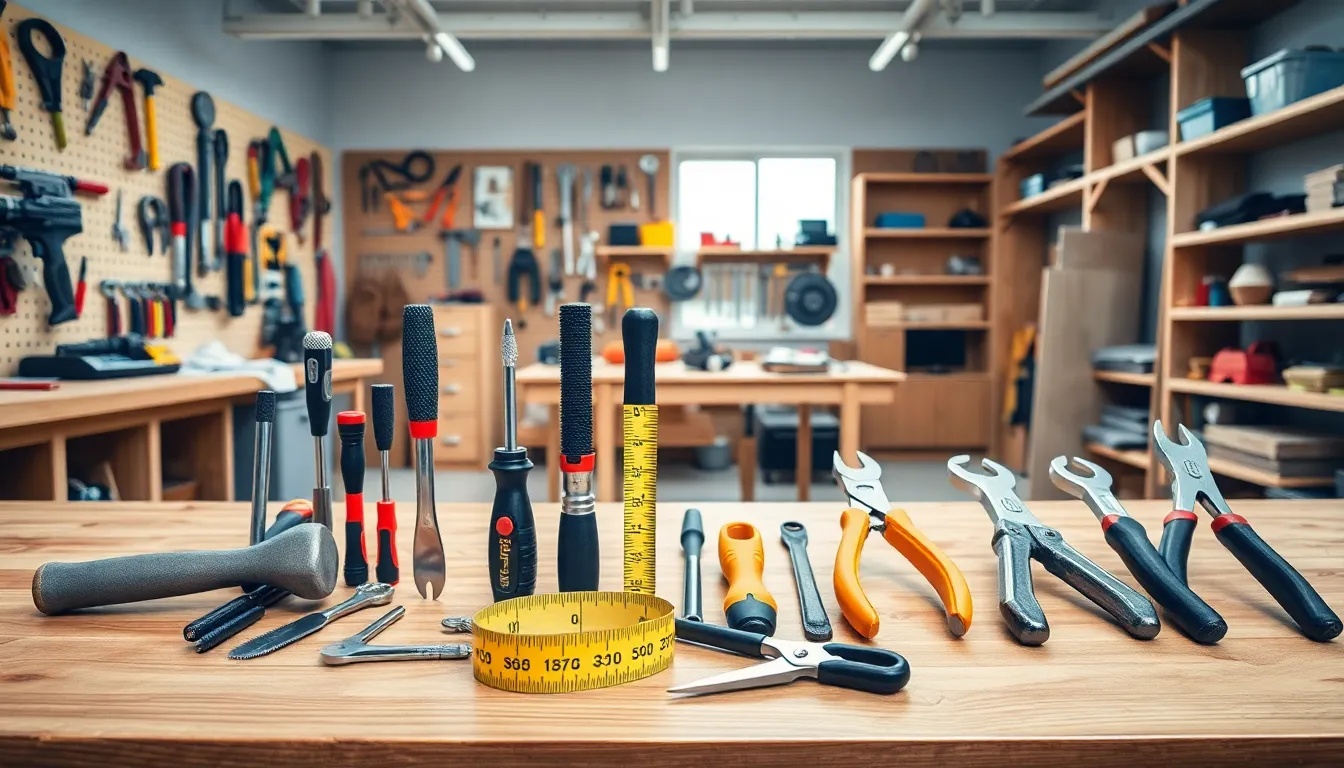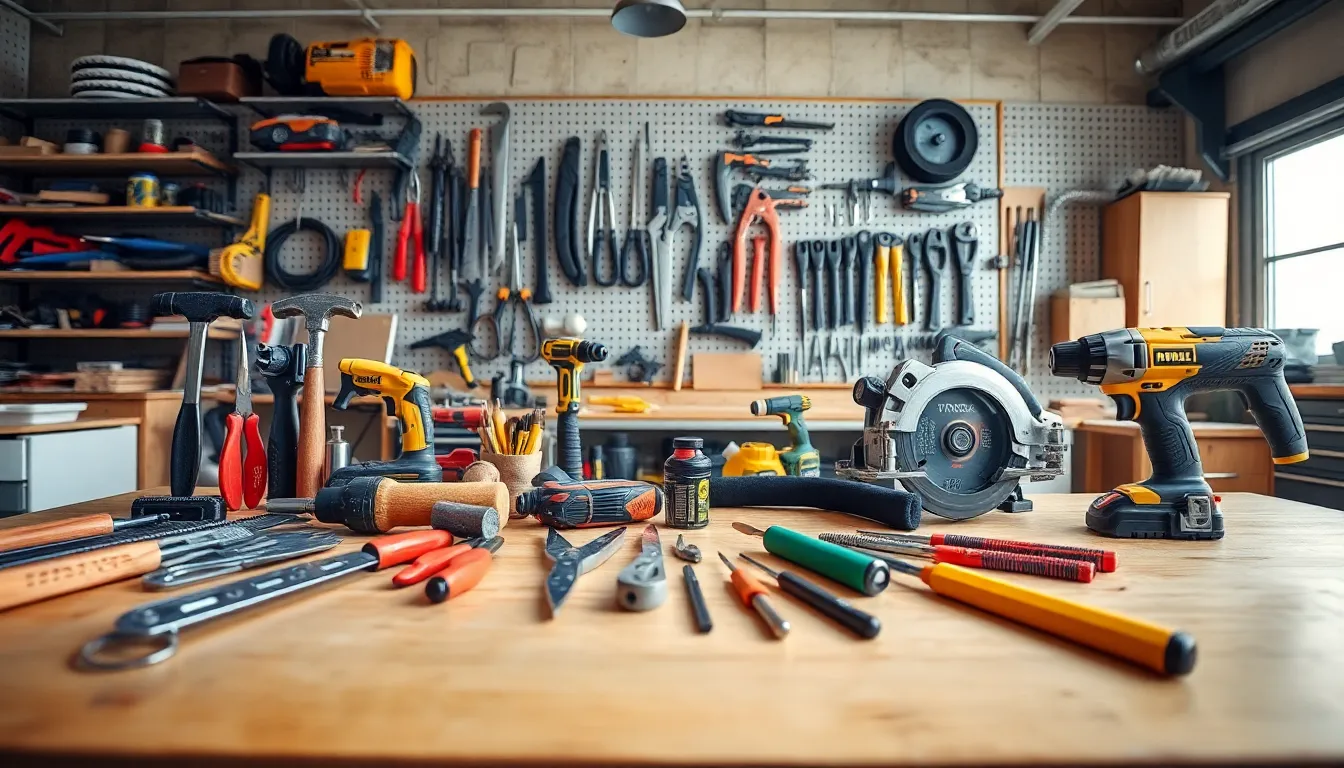Whether you’re a seasoned carpenter or just dipping your toe into the vast ocean of DIY projects, having the right tools can make or break your workshop experience. Picture this: you’re all set to tackle that epic bookshelf you’ve been dreaming about, only to find yourself on a wild goose chase for a missing screwdriver. Frustrating, right? The truth is, an organized workshop with the right tools can turn both intimidating tasks and nifty projects into a walk in the park, or at least a pleasant stroll. So, grab your favorite mug of coffee (or something stronger) as we jump into a comprehensive workshop tools list that ensures you’re never caught unprepared again.
Table of Contents
ToggleEssential Hand Tools

Every workshop needs its heavy hitters, and essential hand tools are the backbone of any craftsman’s toolkit. First and foremost, let’s talk about a hammer, the classic choice for driving nails and occasionally releasing pent-up frustration. Next up, a set of screwdrivers is vital: you’ll often encounter both Phillips and flathead types, so make sure no size is left behind. Moving on, a measuring tape is an unsung hero, ensuring that everything fits perfectly (unless you’re building a ‘rustic’ chair by ‘eyeballing’ it). Also, a reliable saw, whether a hand saw or a coping saw, is essential for cutting wood down to size. Don’t forget about pliers: they’re perfect for gripping, twisting, and, let’s face it, being a general tool ninja when things go south. Completing this lineup are wrenches of various sizes, ready for any nuts and bolts that come your way. This versatile combination of hand tools lays the foundation for successful projects in any workshop.
Power Tools for Every Workshop
Power tools can significantly simplify tasks, making them faster and often more efficient. These tools are the real game-changers. Start with a cordless drill, it’s practically a staple, enabling you to drill holes or drive screws without being tethered by a cord. Then, there’s the jigsaw, which is perfect for cutting curves and intricate shapes in wood and other materials. Next, consider a table saw: it offers precision and speed when working with larger sheets of plywood or lumber, allowing for straight cuts that hand tools can only dream about. A miter saw also deserves a spot, ideal for making angled cuts that will elevate the aesthetic of any project. Don’t forget about sanders, whether it’s a handheld option or a stationary one, sanding is an inevitable part of many DIY endeavors. Finally, an oscillating tool can assist in a multitude of tasks, from cutting to sanding, truly a jack of all trades.
Measuring and Layout Tools
Precision is the name of the game in any workshop, and that’s where measuring and layout tools shine. First on the list is a level, ensuring that everything from shelves to frames is straight, which is essential for avoiding the dreaded Italian restaurant table effect, i.e., a wobbly finish. Next, a combination square is a must-have for marking lines and measuring angles accurately. Don’t overlook the importance of a chalk line for creating long, straight lines across wood or walls, it’s like a painter’s secret weapon. A caliper can offer precise measurements where standard rulers fall short. To finish off this toolkit, consider investing in a high-quality laser measurer. The speed and accuracy of these tools can save you from headaches and mishaps during your projects.
Safety Equipment and Gear
With great power comes great responsibility, especially in a workshop. Safety should always be the top priority, and that means gearing up properly before diving into any project. Start with a solid pair of safety goggles to protect those precious peepers from flying debris. Next, invest in ear protection: power tools can get loud, and prolonged exposure can lead to lasting damage. A dust mask or respirator is essential when sanding or cutting, as it filters out harmful particles you don’t want to breathe in. And let’s not forget about sturdy work gloves, they’ll keep your hands safe from sharp tools and splinters better than your motto of “I’ll be careful.” Finally, a first aid kit needs to be present and stocked: accidents happen, so being prepared is half the battle.
Maintenance and Organization Tools
Once you’ve amassed an impressive collection of tools, keeping everything in tip-top shape is crucial. Toolboxes and storage systems will ensure that your tools are organized and accessible. Consider a workbench featuring slots or pegboards: these can greatly enhance your workflow by keeping your most-used tools within arm’s reach. For precision tools, a tool chest can keep them safe from damage while offering planty of drawer space. You’ll also want a reliable sharpening tool for your saws and chisels, as a sharp tool is a safe tool. Regularly checking your equipment will prolong its life and performance, allowing you to focus on productive work rather than frustrating repairs.
Advanced Workshop Tools
As your skills develop, it might be time to invest in advanced workshop tools that can elevate your projects to the next level. A bandsaw, for instance, is excellent for intricate cuts in thick materials, making it perfect for specialized woodworking projects. For those who love working with fabrics, a sewing machine opens up a world of creative possibilities. If you’re leaning toward metalworking, a welder may become your best friend. To ensure your workspace remains comfortable, consider an automatic doweling jigs that offer consistency and accuracy in joint-making. When it comes to electronics, a 3D printer can add flair and functionality to your workshop, allowing you to prototype and create custom designs efficiently.




